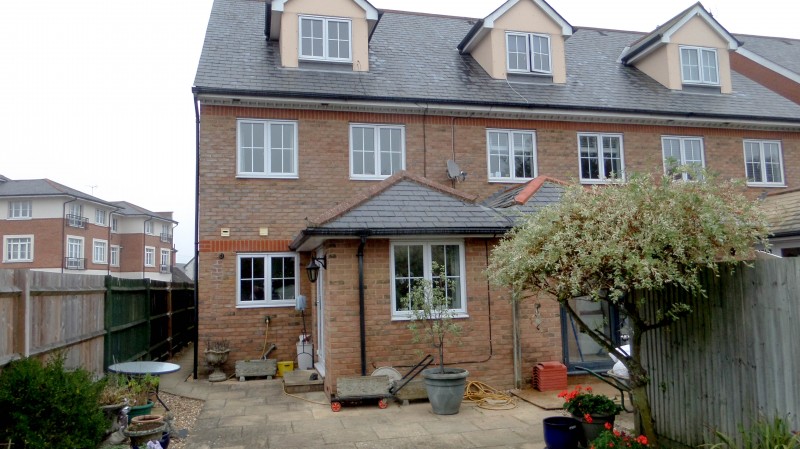You are here: What is a Cheshire Brine search and why is it important?
Salt has been extracted in Cheshire since Roman times and still is today. Methods have, of course, changed but if you are purchasing property in this area of North West England, salt extraction poses a number of risks that mean you should definitely consider instructing one of these searches.
In Roman times, settlements sprang up around strategic water crossings and the presence of brine springs. Lead salt pans were used to extract the salt from the brine.
In the 19th century it became uneconomical to mine salt this way and extraction methods changed to solvent extraction using water. Hot water was pumped through the mines, dissolving the salt. The resultant brine was pumped out and the salt extracted from the brine. This technique was known as wild brine pumping or natural brine pumping. It weakened mines and caused land subsidence as mines collapsed. This type of uncontrolled brine pumping ceased at the end of 1986.
In 1952 the Cheshire Brine Compensation Board was created to provide compensation for subsidence caused by brine extraction within the Cheshire Brine Subsidence District (CBSD). This area covers the south of Warrington and Manchester, to the east of Newcastle under Lyme.
Today, the manufacture of white salt is concentrated in Middlewich, by British Salt, better known to us as Saxa. This area produces provides 57% of the UK’s cooking salt.
Mining activities, both live and historical can seriously impact the value and enjoyment of your property. Consider the noise and plant traffic associated with live mining activities. Historical mining is not always obvious, hidden shafts can cause serious ground stability hazards. And both existing and historical mining activities may impact your insurance premiums and the value of your property.
If you are wanting to buy a property in the CBSD, this search is mandatory, but if you are hoping to move to any of these areas, a Cheshire Brine search is highly recommended.

Are they mandatory?
Yes, within the CBSD (see above).
However, there are also areas outside the CBSD that are impacted; particularly Nantwich and around Droitwich, Pressall Saltfield, Haverton Hill and Salthome and Stafford.
When are they ordered?
As with all the other searches we have covered, they should be ordered as soon as you appoint your conveyancing solicitor. As a minimum you should order Land Registry and Local Searches, Water and Drainage Searches, an Environmental Search and a Flood Search (see previous articles). Other searches (depending on where the property is in the country) include Ground Stability, Tin, Bath Stone, Coal and Brine, China and Ball Clay, Canal and Rivers Trust and Radon Gas.
One of the first things your conveyancer will do is ask you for money ‘on account’ in order to pay for these searches.
Are there different types?
Yes. Some specialist providers will supply stand-alone searches. While other more generalist providers will include Cheshire Brine information within other mining searches that also include information on limestone, ground stability, tin, Bath Stone, coal and brine, China and Ball Clay. Your conveyancing professional will advise which is best.
What do they tell you?
Any search that your conveyancing professional advises you to purchase, will cover two subjects as a minimum:
- Previous mining activity
- Deposits that may be worked in the future
A specialist search should include clear and concise information detailing historic mining, current and any potential future mining. The report may also include a plan extract confirming the property location and any relevant mining features. If mine workings are identified, recommendations to mitigate the risks may also be provided.
Most importantly a search will reveal whether the property is in the immediate vicinity of any current or past mine workings.
The structure of the document is likely to consist of:
- Front page summary
- Clear and concise report
- A plan showing the property in relation to mining
- Professional opinion of the mining data
What do they cost?
The cost of a full search depends on the type of search and the supplier, but they usually start from £27 plus VAT. In some cases, a combined mining and environmental search can be ordered, which will be cheaper than having separate searches for each type of mineral.
How long do they last?
When acting on a conveyance, your solicitor must follow The UK Finance Mortgage Lender’s Handbook, it says that searches must be no more than 6 months old on completion.
If you are thinking of buying or selling your home, you may find some of these services useful:
Conveyancing
Get instant estimates from Conveyancers and Solicitors in your local area
Mortgage Brokers
I need help getting a mortgage
Estate Agent
Find a local Estate Agent
Valuation Surveys
If you need a Valuation Survey
Building Surveys
I want a local surveyor to do a Building Survey for me
Removals
I want to find a removal company
Energy Performance Certificate
Energy Performance Certificates